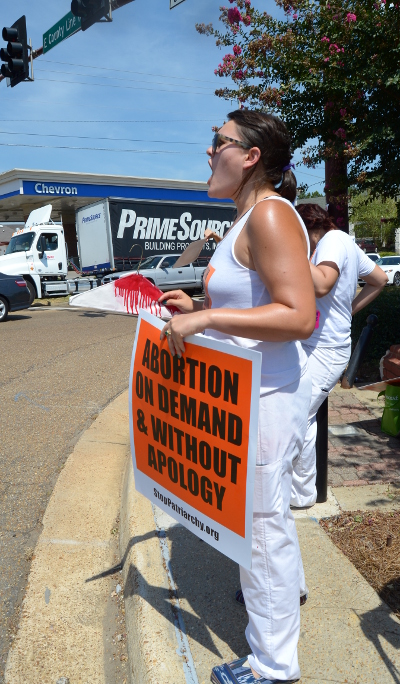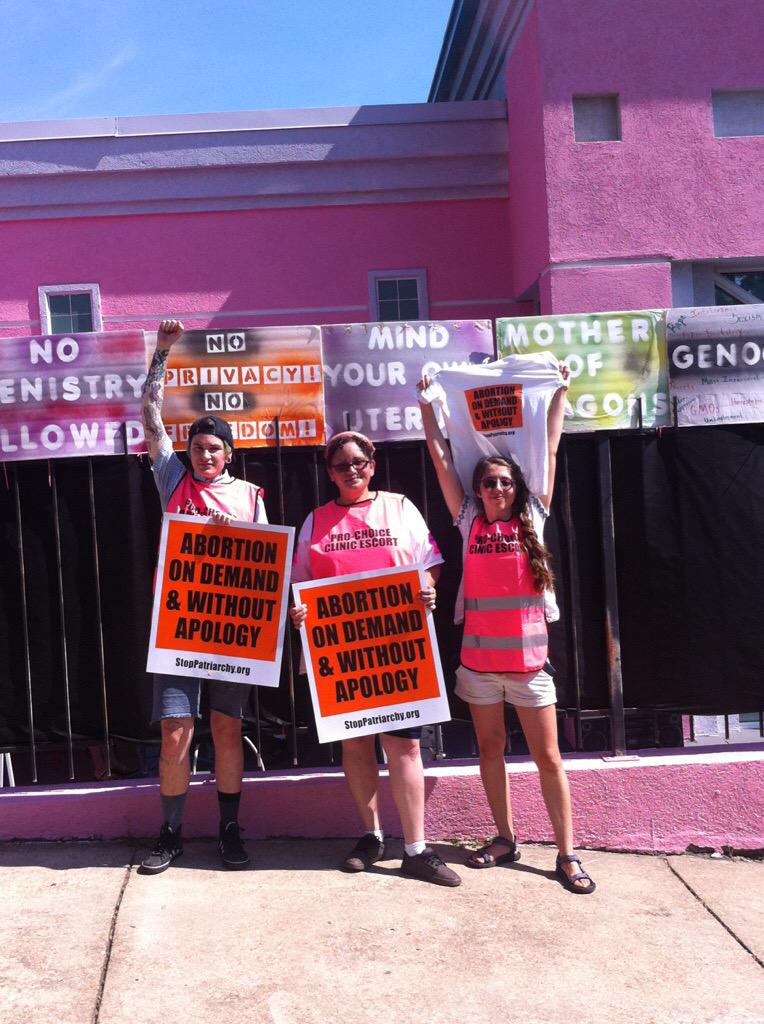Dispatch from a Revolution Club Member
Day One in Jackson, Mississippi: A Lively Example of the Urgency for Revolution
August 4, 2015 | Revolution Newspaper | revcom.us
Telling the truth about abortion in Jackson, MS.
We approached a house that, like many other houses in its vicinity, looked uninhabitable—the glass of the windows was broken, the wood was falling apart; nevertheless the house loosely clung to its foundation. Before we turned away, a very friendly woman, probably in her 60s, came out of the house, smiling, curious about these two women with T-shirts that read REVOLUTION―NOTHING LESS! We said, “Hello, we are revolutionaries!”
Betsy is a Black woman who resides in utter desolation in Jackson, Mississippi. Her life concentrates the horrors that millions of Black people experience in a country founded on slavery and genocide. She is among the millions of Black people who have been cast off by this system. When we brought the movement for revolution to Betsy’s doorstep and explained how this system perpetuates the oppression of Black people and women, the way out—communist revolution and the leadership we have—she widened her eyes, sat down, and said “OK, let’s talk!” She then proceeded to unbraid the white supremacy and patriarchy prevalent in her life.
The conversation began with a reading of the “You cannot break all the chains except one...” (BAsics 3:22) quote. When we asked her what struck her about the quote, she said, “It’s powerful. It’s a good quote, but I don’t understand it.” We began to break down what this quote means and how liberating women isn’t just a moral question, but that there is a scientific basis for doing so, that we can understand when and how the oppression of women emerged, the way it manifests itself today―through reducing women to breeders and/or sex objects—and, consequently, the pathway to liberating women. It was an experiment; every time we spoke and she asked questions, we realized the need to break things down more concretely and define all of our terms so she could understand that revolution is a complex process rather than a process impossible to understand. Through trial and error we were able to bridge the gap between her current understanding of the state of the world and the revolutionary understanding she needed.
We got into the particularities of why we were in Jackson: to defend the last abortion clinic in the entire state and build a movement dedicated to stopping patriarchy. As we were relaying this all to her, she interjected and said, “Wait you all are against abortion? Or...” and we said we are for abortion which lead her to exclaim, “Oh no, I’m against abortion. I hate that word.” When we asked her why, she repeatedly said, “It’s just wrong, it’s just wrong.” She explained she had six children and thought about getting an abortion a number of times but decided to keep her “babies.” She said once a young woman conveyed to her that she used a coat hanger to give herself an abortion, but that she just couldn’t stay to listen to the young woman because “It was just wrong,” not because a woman was placed in that same situation but because abortion, according to her, is immoral.
After we showed her the brochure (at right) that lays out the science of what an abortion is, the discussion was re-cast in a way that got to our primary disagreement: whether or not a fetus is a baby and resulted in a subtle change in her position. We showed her the picture of what an embryo looks like at the first three weeks of pregnancy and explained that 90 percent of abortions are performed during the first trimester of pregnancy. “That’s how the baby looks?” she asked. “No, that’s how the embryo looks,” we said. We then posed the question, “Do you really think abortion could be called murder?” Instead of responding immediately, Betsy unfolded the pamphlet and pointed at the second picture of a fetus at three months and asked, “What about this one, is that what the baby looks like?” and we said, “No, that’s what the fetus at three months looks like.” We proceeded to tell her that the potential life of a fetus is subordinate to the life of a woman, that a fetus is entirely sustained by the woman’s body, just like any other clump of cells in her body. We reframed the debate around abortion and explained the importance of women having the right to abortion and what this decisive fight is all about: whether women will be enslaved or liberated. We could see in her expression how surprised she was. She was facing for first time the reality of abortion. We then asked her if her view of abortion changed after we came to the doorstep and she said, “No. I’m against abortion but I understand why... why women need abortion.” When we broke down how forced motherhood is female enslavement, that any entity that is state regulated is enslaved she nodded and said, “Yes, yes. I understand why a woman would get an abortion now that you talked to me. I understand why, can I keep this [the brochure]? I am going to read it again.”
We then returned to the fact that we, as revolutionaries, understand that the way Black people are treated―pushed into ghettos, incarcerated, shot down by brutal cops, essentially offered no future and means to grow and flourish as a people—flows out of the same system that is keeping half of humanity down. We gave her a copy of Revolution newspaper and when she saw Sandra Bland on the cover, she became sad and exclaimed, “Why did this happen? They [the cops] shot my son twice in the back when he was filling his car up with gas. There’s a video of it so I’m suing them. He is still alive though. My other son was shot by a person who thought he was someone he wasn’t.” We explained to her we no longer have to live this way―in a world where Black and Brown people’s futures are laid out before they are even born, that this system cannot do away with the oppression of Black people, that it will continue to keep them down so long as it remains intact. She said she was glad that we talked to her and introduced us to her 12-year-old grandson who had been listening in on the latter half of our discussion. He asked us, “What are you about? What are you promoting?” and after we explained he said, “We need change, we can’t live like this no more, and I want to promote it too.” He explained that a good way he could promote it was through his Instagram because he has over 6,000 followers. He took a picture with BAsics so his “friends could learn about the revolution.”
At the last abortion clinic in Mississippi.
The process of unfolding the need for revolution combined with the horrors Betsy faces illuminates how much she relates to the revolution—a Black woman who grew up in Mississippi, living in an uninhabitable house, two of her sons have been shot; the fact that she had considered abortion and knew somebody who self-induced an abortion with a coat hanger. And there she was, sitting in the window-less house, no AC on a hot summer day in Mississippi, a house in the middle of this deserted neighborhood, living the life that millions of people are forced to live in this country, deprived of a future with the exception of rearing children and just getting by. This revolution was exactly what she needed to hear about, it was right that we were there, she is a lively example of the urgency for revolution.
Volunteers Needed... for revcom.us and Revolution
If you like this article, subscribe, donate to and sustain Revolution newspaper.

 Jackson, Mississippi
Jackson, Mississippi







